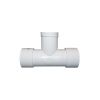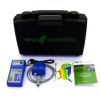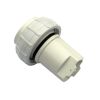Eno Scientific WS 131 Flow Meter
Features
- Flow meter housings are available in 5 sizes
- Data can be displayed and logged by the Well Sounder 2010 PRO
- Includes the total flow, flow rate and recovery rate functions
- Free ground shipping
- Expedited repair and warranty service
- Lifetime technical support
- More
Overview
The Eno Scientific WS 131 features a simple design consisting of a PVC housing and an electronic sensor module that easily attaches to the housing using a hand-tightened ring nut. Once the sensor is installed, it transmits electrical pulses that are generated as water moves past the paddle wheel. The amount of water volume that passes through the pipe can be interpreted by an Eno Scientific water level meter like the Well Sounder 2010 Pro. During inactivity, the sensor can be removed and replaced with an inexpensive plug with the same kind of hand-tightened ring nut concept.
Design
Flow meter housings are available in various sizes. The 1", 1.5" and 2" housings are in-line tees made with Type 1 PVC with sockets for schedule 40 PVC pipes, and compatible with common PVC piping and adhesives. The 3" and 4" housings are saddle tees made of Type 1 PVC which clamps onto schedule 40 PCV pipes. The paddle wheel is made of a tough polyethylene material and is the only object subject to wear in the entire system. In the case of highly abrasive water flow, the paddle wheel may experience wear with time but is easily replaced without tools.
Mechanics
The electronic flow sensor operates off a 5-24 VDC power supply and provides an output voltage on the signal line, which switches between Vin and ground as the paddle wheel turns. Data collection is configurable by either plugging a ready-to-plug cable into the Well Sounder 2010 Pro, or with three-wire leads for connection to other data logging devices. An accessory splitter is necessary for the Well Sounder to monitor and log data from both the flow meter and the probe.
- Materials
- Housings: Type 1 PVC
- Paddle Wheel: HDPE
- O-Ring: Buna N
- Axle: Tungsten Carbide
- Plumbing & Physical
- Pipe Size: Schedule 40 PVC
- Test Pressure: 240 psi
- Temperature: 32 – 140° F (0 – 60° C)
- Dimensions
- 1" Housing: 5.75 x 4.5 x 2.4″
- 1.5" Housing: 6.25 x 5.25 x 2.4″
- 2" Housing: 7.11 x 5.75 x 3″
- 3" Housing: 5.0 x 5.5 x 6.5″
- 4" Housing: 5.0 x 6.5 x 7.5″
- Clearance for Sensor Removal: 3.5”
- Electrical
- Power: 5 – 24V at 500 uA max
- Output Signal: Pull-to-ground (+V – 0V)
- Pulse Width: ~5mS
- Frequency: 0.3 – 200 Hz
- (1) Flow meter
In The News
Wave-Powered Buoy Deployed in Puget Sound
While the development of solar-powered monitoring systems has improved access to real-time environmental data, solar power is still limited by low light conditions, such as poor weather, nighttime, or high-latitude environments. To supplement these incumbent power solutions at sea, Ocean Motion Technologies has developed a small-scale ocean wave energy system that can be directly integrated with existing data buoy platforms. Not only does wave energy supplement solar power during periods when the buoys are limited by light availability, but it also allows data buoys to perform beyond their current power capacities.
Read MoreLong-Term Monitoring in the Chautauqua Lake Watershed
With a widely developed shoreline, Chautauqua Lake experiences influxes of non-point source pollution that have historically impacted the health of the lake. The Chautauqua Lake Association (CLA) has been monitoring the lake for over two decades, reporting on changes that have occurred over the years. A pair of local lake advocates, Jane and Doug Conroe, have lived on the lake for over 40 years and have played an important role in establishing monitoring programs and facilitating consistent data collection throughout the watershed. Doug has been involved with the Chautauqua Lake Association (CLA) since the pair moved to the area in 1980, and is currently serving as the Executive Director.
Read MoreNo Red Herrings: Data Driving the Largest Salt Marsh Restoration in the NE USA
The Herring River system encompasses around 1,000 acres in the Towns of Wellfleet and Truro, Massachusetts. In 1909, the Chequessett Neck Road dike was built at the river’s mouth, drastically limiting tidal flow. Today, it’s one of the most restricted estuaries in the northeastern United States. As a result, the area has suffered environmental decline, including poor water quality, hypoxia, lower pH, and salt marsh degradation. In 2023, the Town of Wellfleet received $14.7 million from NOAA’s Office of Habitat Conservation to fund the Herring River Restoration Project (HRRP). Francesco Peri, President and CEO at Charybdis Group LLC, uses a network of NexSens data loggers to monitor water level and water quality on the Herring River.
Read More
























